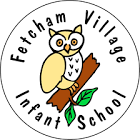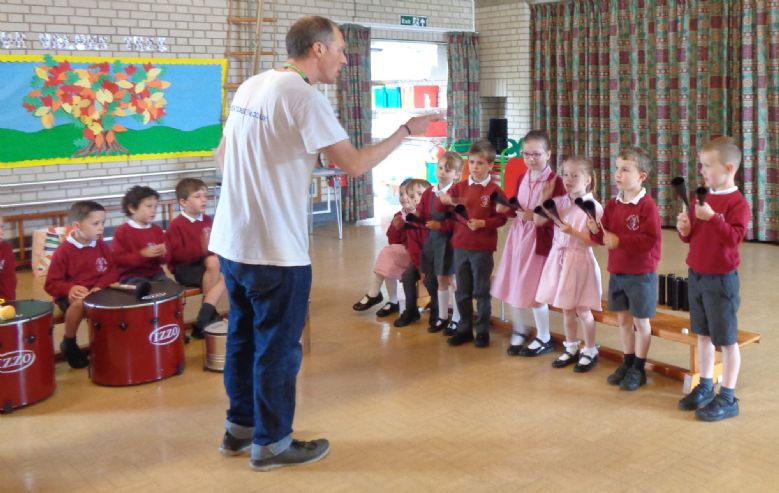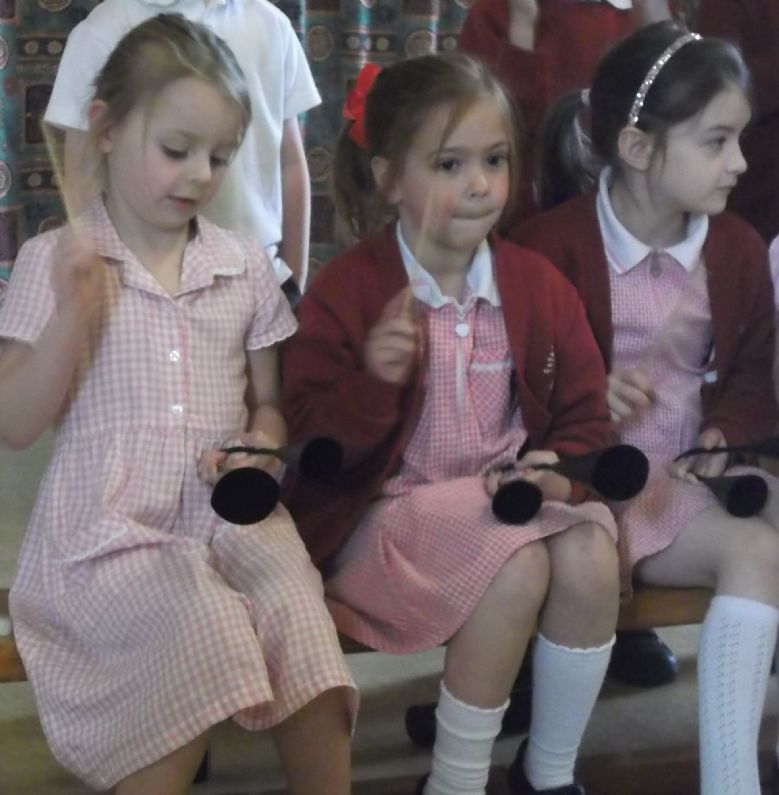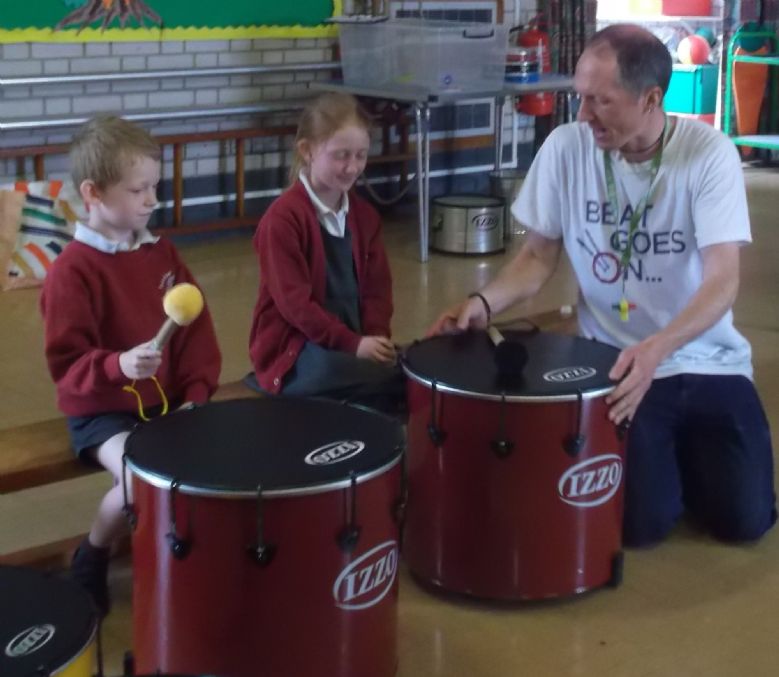Music
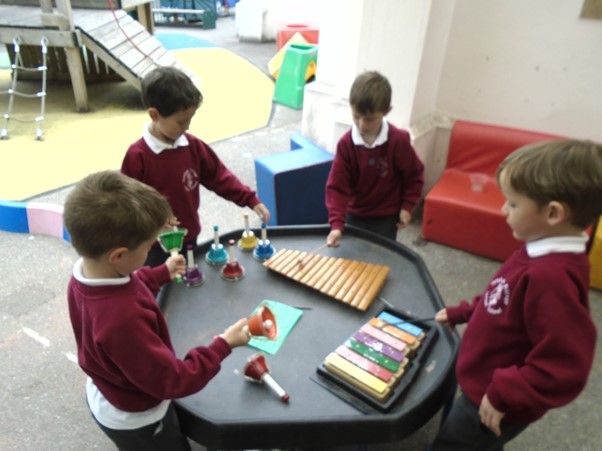
Read our Summary Music Development Plan
Music is a part of daily school life at Fetcham Village Infant School. We give every child the opportunity to develop a love of music to enrich their learning and well-being. Music bonds us together as a school community and connects us to our wider community as we mark seasonal celebrations through musical performances. Through performing regularly to an audience, children build self-esteem and confidence and get a sense of ‘being a musician’.
Music helps our children to understand and to practise our School Values; for example, demonstrating ‘we are curious’ as they listen to and comment on a range of musical styles and showing 'we are brave' by performing in front of others. They are introduced to a range of musical styles through listening to and responding to live and recorded performances.
Singing is at the heart of our musical learning. Through singing, along with chanting, body percussion and using tuned and untuned percussion instruments, children explore and begin to understand musical elements such as beat and pitch. Children develop the knowledge and skills needed to play a simple tune, beat and rhythm on basic percussion instruments. They also look at symbols that represent sounds, ready for learning about more formal musical notation in Key Stage 2.
Each child develops their ability to respond to music and to express some ideas and feelings through music (such as using sounds to tell a story). They take some risks as they explore new sound patterns and sound effects. They improvise and create their own pieces, inspired by a range of stimuli. They appraise their own creations and respond thoughtfully to the music made by their peers and composers. They begin to use basic musical vocabulary to talk about music.
Our Approach
We provide a practical, exploratory approach to musical learning. Children experience and explore musical concepts (e.g. beat) through ‘hands on’ singing/playing activities and listening activities. This gives an appropriate basis for their developing understanding of those concepts and for using the related musical vocabulary.
Planning, sequencing and progression
Our Music Curriculum at Fetcham Village Infant School has been carefully planned for progression across all year groups supported by the Music Express Online Scheme of Work. Reception teachers use Music Express alongside other resources, selected for their relevance to the revised EYFS Statutory Framework 2021 and links to our wider Reception curriculum as well as preparing children for music in Year 1.
Our Music Curriculum Map sets out the learning across the school in each half term. This covers weekly class lessons in every year group, as well as whole school singing assemblies and events. The sequencing of learning in weekly class music lessons has been tailored to Fetcham Village Infant School to ensure that all year groups work on a particular concept at the same time where possible (e.g. beat). We also ensure that children return to and build upon their understanding of the key elements of beat and pitch throughout the year.
Teachers have clear expectations of the end points children need to reach by the end of each year as set out in our Music Progression Grid. This Progression Grid defines how children’s music skills, knowledge and vocabulary develop in each year from Reception to Year 2. It is organised under five key elements: singing, playing an instrument, acting as a musician, composing and listening and appraising. It guides our teaching and assessment and also supports differentiation.
A range of assessment strategies are used continuously in Music Lessons. This includes high quality questioning, observation and peer and self assessment. This enables teachers and teaching assistants to adapt their teaching and support ‘in the moment’ and to adapt planning for future learning.
Whole School Activities
Children and staff in Key Stage One come together each morning for a 10-minute ‘Wake and Shake’. This involves all the children and staff coming together to do two dances to music (led by an adult). The children sing along to the songs as they dance. It gives everyone an opportunity to feel a sense of belonging, fun, happiness and movement. The outdoor speakers installed in our playground enable Wake and Shake to take place outside in the warmer months.
Singing and performing skills are developed through weekly singing assemblies. These assemblies feature vocal warm-ups and acappella singing (such as ‘call and response’ songs) as well as learning songs for fun and for performances. The resources for these assemblies are kept fresh and varied through training and materials sourced from Surrey Music Hub and other organisations.
The children have regular opportunities to perform for an audience within their class and at whole school celebrations. Year 2 children perform to a wider audience by taking part in the annual Year 2 Effingham Learning Partnership Music Festival, involving a group of schools from the local area performing to and with each other. Year 2 children also do an extended performance, featuring music, to the rest of the school and their parents/carers for their Leavers Assembly in the last week of the Summer term.
Enhancements
We organise workshops and performances from professional musicians to excite and inspire our children. Body Percussion and Samba workshops from Beat Goes On were delivered most recently in May 2022. Students from the nearby Yehudi Menuhin of Music volunteered with us on a weekly basis in 2022 and 2023, including performing violin and viola pieces to every class in the school. Our Year 2 children also have the opportunity to see highlights from Oakfield Junior School's Summer Concert each June.
We have good links with other organisations to enhance and inform our music curriculum: with Surrey Music Hub, Oakfield Junior School and the Yehudi Menuhin School of Music.
What outcomes do we seek to achieve in Music?
-
Children will retain knowledge and skills relevant to music and have a strong basis from which to develop their musical learning in Key Stage 2.
-
Children will have the opportunity to foster their flair for singing and playing music and use this as a form of expression.
-
Opportunities for improved wellbeing and confidence will be increased.
-
Children will gain experience of performing to an audience and do this with some confidence.
-
Children can express their own musical preferences.
-
Children will have an awareness and enjoyment of different musical styles and experiences.
We measure the impact of our Music curriculum through the following methods:
-
Interviewing the children about their learning (Pupil Voice).
-
Conducting learning walks to observe music teaching and learning.
-
Feedback and discussion with staff.
-
Termly tracking of children’s progression towards our ‘end points’.
-
On-going feedback to the children and from the children during the lessons.
Some musical resources to explore at home:
Singing Medicine - bringing wellbeing through singing to children and adults
Go Kid Music - Al Start's children's songs, online memberships and courses for home and school
Kaboom Percussion - incredible, innovative ways of creating percussion instruments and pieces! There's also tutorials on 'cup' percussion and table drumming.
